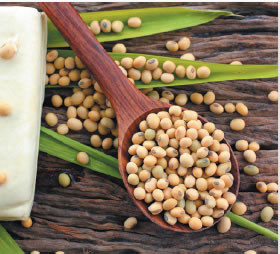
Wildfires: How to cope when smoke affects air quality and health

What can magnesium do for you and how much do you need?

Dry socket: Preventing and treating a painful condition that can occur after tooth extraction

What happens during sleep �� and how to improve it

How is metastatic prostate cancer detected and treated in men over 70?

Could biofeedback help your migraines?

What is autism spectrum disorder?

Plantar warts: Options for treating this common foot condition

Cancer survivorship: What comes next after treatment

Nutritional yeast: Does this savory, vegan seasoning pack a nutritional punch?
Nutrition Archive
Articles
To lower stroke risk, be sure to get this B vitamin
Green vegetables and citrus fruits are good natural sources of folate.
If you're among the one in three American adults with high blood pressure, be sure you're getting enough of the B vitamin known as folate. Doing so may lower your odds of having a stroke, a new study suggests.
Should you work chocolate into your diet?
Cocoa flavanols found in chocolate are powerful antioxidants that may boost your health. Image: Thinkstock |
Cocoa flavanols in chocolate are linked to improved thinking skills and better heart health.
Should you get your nutrients from food or from supplements?
Image: Thinkstock Try to improve your diet before turning to supplements. Food has beneficial nutrients, such as flavonoids and antioxidants, that aren't in most supplements. |
Supplements can plug dietary gaps, but nutrients from food are most important.
The fresh food you eat is loaded with nutrients necessary for good health, such as magnesium, calcium, and vitamins A and C. But many older adults aren't getting enough nutrients from their diets.
Eating peanuts may extend your life
Health studies rarely involve people on opposite sides of the globe who have very different lifestyles. However, researchers at Vanderbilt Medical School took that approach when they pooled data from dietary studies of 72,000 men and women in the southeastern United States and 135,000 people in Shanghai, China. It turns out that the Americans and Chinese have something in common—they both eat a lot of peanuts—and they may be living longer as a result.
All of the participants filled out detailed questionnaires on the foods they ate regularly. The research team noted that peanuts accounted for 50% of nuts eaten by Americans and almost all the nuts consumed by the Chinese.
Why do women fall?
It's well known that women fall more often than men, but why is that so? A team of Canadian researchers tackled that question by looking for factors that tend to put women at higher risk than men for spills.
The researchers studied around 15,000 adults ages 65 and older who were enrolled in the Canadian Community Health Survey–Healthy Aging. All the participants were asked if they had suffered a fall serious enough to limit their normal activity. People who answered "yes" were then queried about their lifestyles and medical histories. When the researchers analyzed the answers, they determined that stroke, arthritis, and poor nutrition increased the risk of falls in both men and women. However, different risk factors were linked to falls for women, including being 85 or older, having at least one alcoholic drink a week, taking five or more medications, and having diabetes or osteoporosis. The findings were reported online Feb. 19, 2015, by the American Journal of Epidemiology.
Ask the doctor: Why am I getting shorter?
After age 40, people lose about half an inch in height with each decade, mainly in the spine. Image: Thinkstock |
Q. Why do people over 60 lose height? I've lost a few inches over the years. Can this be prevented?
New concerns about diet sodas
They're linked to calorie absorption, high blood pressure, and heart trouble.
For weight-conscious people who love the bite of carbonation and the taste of various soft drinks, the advent of sugar-free sodas 60 years ago seemed a blessing: if there were no calories, you didn't have to worry about weight gain—and the diseases that go along with obesity, like diabetes and heart disease. "But there are growing doubts about whether diet sodas really help people lose weight and avoid diabetes," says Dr. Anthony Komaroff, editor in chief of the Health Letter.
Healthy lifestyle protects women against heart disease
It's no secret that healthy living can reduce your risk for developing heart disease. But ever wonder how much it may help? Up to 92%, suggests a study published Jan. 6, 2015, in the Journal of the American College of Cardiology. It evaluated health habits of 70,000 young and middle-aged women during a 20-year period. The habits included not smoking; exercising for at least 2.5 hours each week; watching TV for fewer than seven hours a week; consuming a diet rich in vegetables, legumes, and whole grains but low in red meat, refined grains, and sugar; consuming no more than one alcoholic drink daily; and having a body mass index in the normal range. Compared with women who had none of those habits, women with all six reduced their risk of developing heart disease by 92%. Why do those habits provide so much protection against heart disease? "Limiting TV watching frees up time for exercise, and the other activities are known to reduce blood pressure, LDL cholesterol, and blood sugar, which reduce the three major risk factors for heart disease—hypertension, high levels of cholesterol and triglycerides, and diabetes," says Dr. Randall Zusman, a cardiologist and Harvard Medical School associate professor. And even though the study involved young and middle-aged women, Dr. Zusman reminds us that it's never too late to adopt a healthy lifestyle.
Image: Thinkstock
Weight-loss drugs and your heart
Weight-loss drugs aren't for people hoping to lose just a few pounds. Image: Thinkstock |
Some first-generation diet pills proved risky to the heart. New drugs may have expanded the options for treating obesity.
Add soy to your diet, but don't subtract other healthy foods
Soybeans, a legume, are rich in protein, polyunsaturated fats, fiber, vitamins, and minerals. |
Soy foods can help you build a healthy diet, but their ability to prevent heart disease and cancer remain unproven. Soy foods, from soy milk to tofu, are often touted for their health benefits. But if you add soy to your diet, be mindful about what you are pushing off the plate.

Wildfires: How to cope when smoke affects air quality and health

What can magnesium do for you and how much do you need?

Dry socket: Preventing and treating a painful condition that can occur after tooth extraction

What happens during sleep �� and how to improve it

How is metastatic prostate cancer detected and treated in men over 70?

Could biofeedback help your migraines?

What is autism spectrum disorder?

Plantar warts: Options for treating this common foot condition

Cancer survivorship: What comes next after treatment

Nutritional yeast: Does this savory, vegan seasoning pack a nutritional punch?
Free Healthbeat Signup
Get the latest in health news delivered to your inbox!
Sign Up









